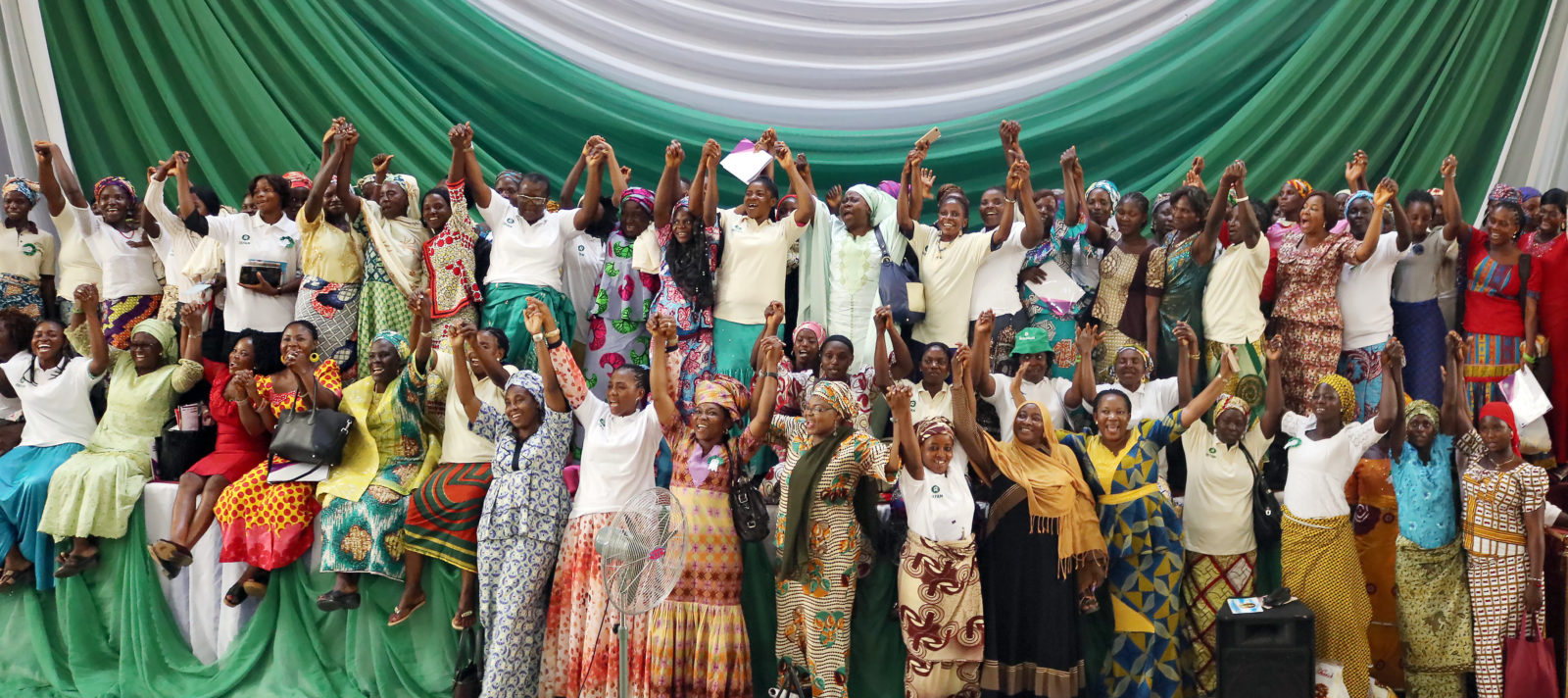WPHF is supporting women in Nigeria to contribute to lasting peace by financing a range of local CSO projects that aim to end sexual and gender-based violence, protect women’s rights and respond to COVID-19 in settings of conflict and crises.
Our Work
In Nigeria, the WPHF and Spotlight Initiative partnership is channeling urgently needed financing to grassroots women’s organizations working to end violence against women and advance human rights and gender equality in peace and security contexts.
WPHF is also channeling critical programmatic and institutional support to local women’s organizations in Nigeria working at the forefront of pandemic response.
Our Partners
WPHF is supporting 9 projects implemented by 17 women-led and women’s rights civil society organizations in Nigeria:
WPHF and Spotlight Initiative Partners: Ending Violence Against Women and Girls in Crisis Settings
- Ambassadors of Dialogue, Climate and Reintegration (DCR Ambassadors) on a project to strengthen the capacity and increase opportunities for women and marginalized groups to effectively advance progress on women’s rights across five targeted Local Government Areas (LGAs) in Borno State.
- Grassroots Researchers Association (GRA) on a project to engage with women and girl survivors of SGBV, as well as existing CSOs/groups working to end SGBV. Existing social mobilization groups and social accountability tools used across Adamawa, Borno and Yobe State will be used as a tool to design and develop capacity building activities for social mobilization groups led by SGBV survivors and service providers.
- Green Concern for Development (MOGEWE Consortium) and four youth organizations and community-based women’s groups in Borno state on a project to mobilize women, youth and girls’ groups for advocacy and awareness on prevention, monitoring/reporting, response and care for survivors of VSWG while using dignity kits as an entry point to all interventions. The project aims to build the capacity of women’s groups at state and local community level and also provides some micro income skill acquisition training for survivors of SGBV.
- Muslim Sisters Organisation (MSO) on a project to improve legal and policy frameworks, strengthen prevention system and assistance mechanisms for survivors of SGBV as well as improve access to effective protection from violence through the sustainable delivery of SRHR services. Activities include advocacy, dialogue with different stakeholders, training, and support of women’s groups.
- Women and Youth Empowerment Initiative (WOYEIN) and a consortium of three other grassroots organizations on a project to undertake data collection and mapping of existing SGBV services and gaps and to build the capacity of institutions and community leaders in addressing SGBV and empower women through trainings in order to improve their local agricultural and livestock businesses.
- Initiative for the Development of the Needy, Orphans, Less privileged and Widows’ (INOL) on a project to influence the way in which VAW in all its forms is addressed and to enhance women’s participation in peacebuilding and conflict resolution by empowering women through radio campaigns, the creation of clubs in schools to end SGBV led by male champions and the creation of a stakeholders’ Monitoring Platform to monitor and report cases of VAW to the relevant authorities.
WPHF COVID-19 Emergency Response Window Partners: Responding to and Surviving COVID-19 in Crises Settings
Explore Our COVID-19 CSO Projects in NigeriaBackground
Women in Nigeria face a wide range of volatile security challenges. The Boko Haram insurgency in the northeast of the country has resulted in a drastic increase in the number of internally displaced people (IDPs), creating a dire need for urgent humanitarian action. Although the Nigerian government has made countering Boko Haram one of its main priorities, more than 1.4 million civilians—the majority of whom are women and girls—have been internally displaced.
The activities of Boko Haram have resulted in an attendant rise in sexual and gender based violence (SGBV) across the country. SGBV is widespread among female lDP’s at various camps and within host communities. Sexual exploitation and abuse against women and girls is systemic across the country. Women and girls in Nigeria lack access to comprehensive response services to meet their needs, such as in the areas of psychosocial, health, justice, security, and economic empowerment.
Our Vision
In Nigeria, WPHF aims to ensure the financing and coordination of local civil society organizations to empower women as key actors in ending violence against women, protecting human rights and leading pandemic response on the road to sustainable peace.
